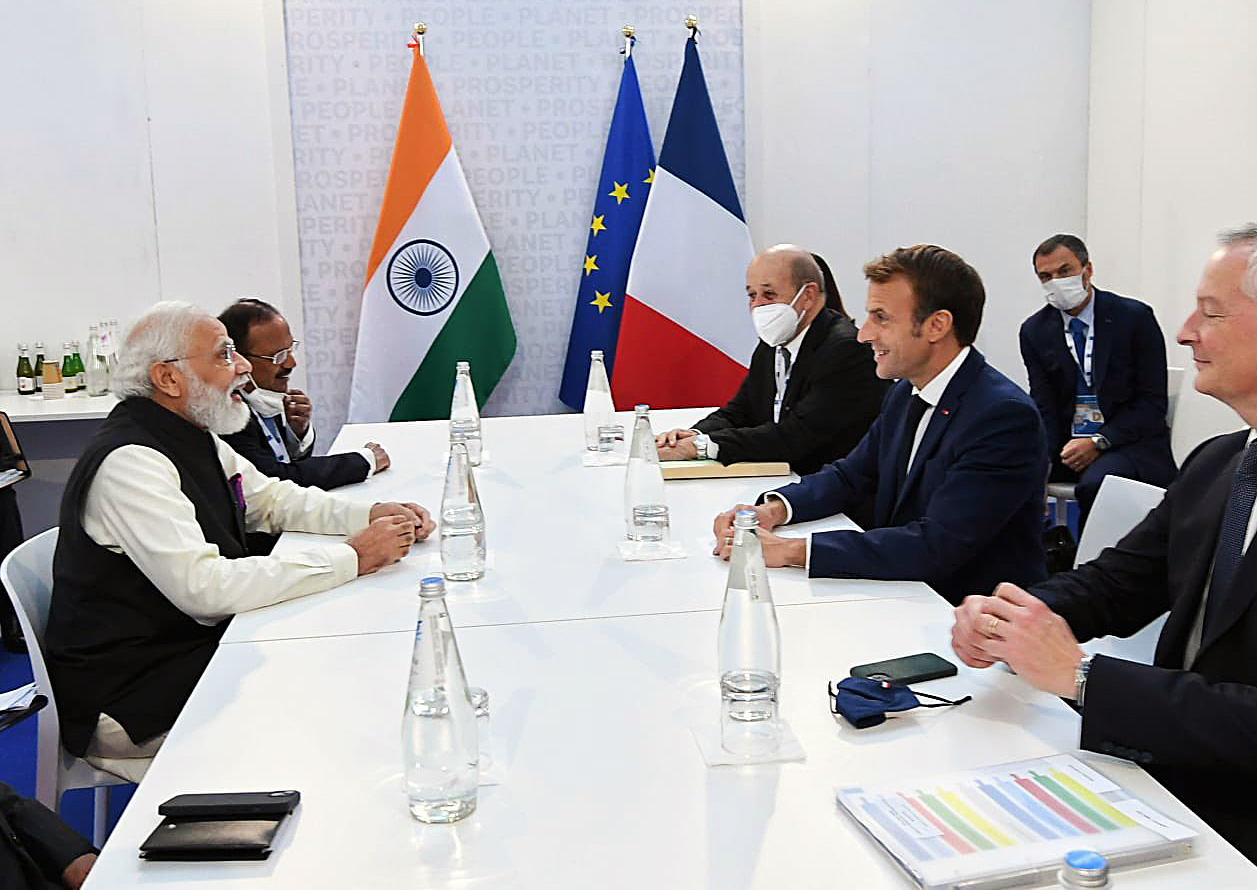The central thrust of PM Modi’s remarks at G20 summit was the imperative for enhanced collaborative approach in the fight against Covid-19.
Rome: India’s emergence as a provider of global public good and its growing stature as problem-solver found support and reaffirmation on Day 1 of the G20 summit as Prime Minister Narendra Modi promised world leaders that India will provide the world with 5 billion vaccines by the end of 2022.
India’s mission of “One Earth One Health” and global minimum corporate tax also garnered enthusiastic endorsement from the leaders of the world’s richest nations.
ENDING VACCINE INEQUITY
In his address at the first session on global health and recovery, PM Modi highlighted India’s Covid-related medical supplies to over 150 countries and the need for enhanced international collaboration to combat this virulent pandemic that has plunged most of the world in prolonged recession. At this meeting, PM Modi underscored the urgent need to end vaccine inequity and the growing divide between the vaccinated and the unvaccinated.
In an important announcement that will be tracked closely by the world, PM Modi told world leaders that India is ready to produce 5 billion vaccine doses by the end of 2022. The vaccine doses will be made available to the world at large, said Foreign Secretary Harsh Vardhan Shringla, quoting PM Modi’s remarks at the G20 summit. “We also believe that WHO’s EUA (emergency use authorisation) for Covaxin would felicitate this process of assisting other countries,” he added.
ONE EARTH, ONE HEALTH
The central thrust of PM Modi’s remarks at the G20 summit was the imperative for enhanced collaborative approach in the fight against Covid-19, which is exemplified in the vision of “One Earth, One Health” advocated by India. Underscoring this interdependence of the world at large, PM Modi has invited G20 countries to make India their partner in economic recovery and supply chain diversification, while reminding them that India remains a trusted partner in the context of reliable supply chains.
In another boost for India’s pitch for vaccine equity, PM Modi’s proposal of mutual recognition of vaccine certificates was supported not only by the G20 but also world leaders like French President Emmanuel Macron during bilateral talks on sidelines of the G20 summit.
“PM Modi exhorted the G20 world leaders to partner in economic recovery and supply chain diversification. He also expressed satisfaction at the G20’s decision to adopt 15% corporate tax,” said Mr Shringla. The concept of minimum global corporate tax, which was first enunciated by PM Modi at the G20 summit in Brisbane, was received very well by world leaders at the Rome summit, said India’s top diplomat Shringla.
In an interaction with the media, India’s G2O Sherpa and Commerce and Industry Minister Piyush Goyal said that India is ensuring that there is no premature withdrawal of support for post Covid economic recovery and the most vulnerable sections are provided necessary support.
The G20 has agreed to extend the Debt Service Suspension initiative till the end of 2021, thereby giving some breathing space to those in need and vulnerable around the world, he said.
SUPPLY CHAINS
The major takeaway from Day 1 of the G20 summit was an emerging global consensus on forging resilient global supply chains and need for urgent steps to spurt global economic recovery. In a boost for India’s global standing, the G20 has endorsed India’s position that extensive Covid-19 immunization is a global public good and he was happy to get support from G20 colleagues for his suggestion on mutual recognition of travel documents, including testing and vaccine certificates, said Mr Goyal.
PM Modi’s multi-pronged engagement at the G20 summit is set to buttress India’s position as the global goods provider and the hub of innovation and technology for manufacturing of vaccines. Against this backdrop of a world stricken with myriad crises, the triple P-mantra of Italian presidency of G20—People, Planet and Prosperity—converges with India’s agenda of post-pandemic economic resurgence. The 20-nation G20 grouping represents around 80% of the world’s GDP, 75% of global trade, and 60% of the world’s population.
Most important, discussions at the G20 summit reaffirmed the interconnectedness of humanity and underlined a tacit endorsement of India’s civilizational ethos of Vasudhaiva Kutumbakam—the world is one family—to address a range of cross-cutting issues, ranging from then pandemic and global economic recovery to climate change.
Climate change will dominate PM Modi’s interventions at the G20 summit on Sunday, 31 October. The Indian leader will speak at G20 Session II on climate change and environment and Session III on sustainable development. He will also participate in a side event on a global summit on supply chain resilience, hosted by US President Joe Biden.
The G20 summit in Rome will set the agenda for COP26—the global climate summit—in Glasgow, which will take place soon after the conclusion of the G20 leaders’ meeting. PM Modi will also participate in the high-level segment of COP-26, titled the World Leaders’ Summit (WLS), on November 1-2.
As India readies to take on the G20 Presidency from 1 December 2022-30 November 2023 and enter the Troika in December 2022, India will continue too proactively highlight issues and concerns of developing countries and emerging market economies in the G20 forum.
Manish Chand is Founder-CEO of India Writes Network and Centre for Global India Insights, a think tank focused on global affairs.

